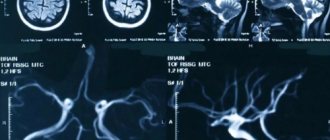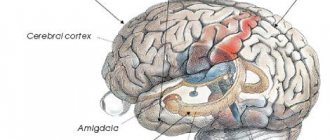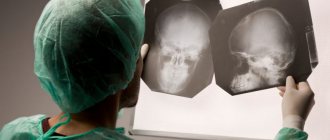A common state of general mental helplessness, which manifests itself in the form of a severe decrease in memory, intelligence, will, and is also reflected in emotional instability and decreased ability to work, is usually called psychoorganic syndrome. Although this disorder can occur at any age, it is often diagnosed in older people, who already have a deteriorating ability to quickly adapt to constantly changing environmental conditions.
Content:
- Psychoorganic syndrome, causes
- Complaints and symptoms of organic psychosyndrome
- Psychoorganic syndrome, clinical variants
- Diagnosis of organic psychosyndrome
- Psychoorganic syndrome, treatment
- Psychotherapy
- Rehabilitation
The human brain often suffers due to exposure to painful factors. As a result, the patient develops a pathological complex, called in medicine psychoorganic syndrome (PS, organic psychosyndrome). It is manifested by memory impairment, deterioration of intellectual capabilities, emotional disturbances and other mental disorders. Identified deviations must be treated with medication and psychotherapeutic methods in specialized clinics.
Options for the development of the disease
In the initial stages, there may be anxious suspiciousness and mild irritability. In the future, these symptoms gradually disappear. They seem to “dissolve” in an increasing decline in intellectual abilities, memory, and empathy. The syndrome can develop according to one of four scenarios:
- Asthenic option. At this stage, patients experience rapid physical and mental exhaustion. The person becomes very irritable, he is unstable in expressing his emotions. Even the smallest environmental irritant - sound, smell - can react painfully. This scenario assumes minor changes in intelligence; Only minor memory impairment may occur.
- Explosive psychoorganic syndrome is the next stage of the disease. It is a combination of emotional excitability (aggression, irritability), moderate memory impairment, and disturbances in adaptation to the external environment. Patients also experience a weakening of will and self-control. The patient becomes very impressionable, sometimes experiencing hysterical states. Alcohol abuse may often occur at this stage. The patients' general condition worsens. Super valuable ideas may arise.
- Euphoric and apathetic scenarios. Patients show complete failure intellectually. There are memory impairments and the ability to remember current events. Both scenarios can be considered types of dementia. As for the euphoric version, there is an increase in mood, and states of complacency and goodwill are not uncommon. However, they can sharply alternate with attacks of aggressiveness and irritation. The patient may become tearful and helpless.
Psychoorganic syndrome, causes
A wide variety of pathologies can lead to the development of the disease.
Most often, doctors have to identify the following causative factors:
- Atrophic phenomena in the brain caused by senile processes.
- Atherosclerosis of blood vessels supplying brain tissue.
- Traumatic head injuries.
- Viral and bacterial infections affecting the central nervous system. Often specialists have to deal with meningitis and encephalitis.
- Tumor processes.
- Brain surgeries.
- Epilepsy.
- Diseases of the endocrine system – diabetes mellitus, damage to the thyroid gland.
- Cardiovascular pathology, strokes.
- Substance addiction.
Forecast
To assess prognostic expectations, the cause of the pathology should be taken into account. In situations where we are talking about post-traumatic problems, conditions after removal of formations, doctors achieve stabilization and improvement of health. With organic processes in the brain, you can only slow down the progression of painful symptoms and improve the quality of life of patients, as well as alleviate the situation for people caring for them.
If you or your relatives have psycho-organic syndrome, try to contact us without delaying your decision for too long. We will find a way out of the situation for any variant of the disease and will do everything possible to achieve a positive result.
Complaints and symptoms of organic psychosyndrome
The disease develops gradually. Minor manifestations become more obvious and are supplemented by new ones.
Patients are diagnosed with:
- Asthenic syndrome with weakness, emotional instability, headaches associated with weather changes, increased blood pressure, and attacks of tachycardia.
- A progressive decrease in the ability to concentrate.
- Absent-mindedness, inattention.
- Mental exhaustion and physical fatigue.
- Weakening of memory, loss of the ability to remember, forgetfulness, turning into amnesia.
- Confabulatory syndrome with distorted memories, fantasizing.
- Narrowing of intellect and usual range of interests. The patient loses the ability to isolate the main from the secondary.
- Dementia process.
- Impoverishment of speech.
- Loss of self-criticism, ethical distortions - a decrease in the ability to determine what is good and what is bad.
PS is characterized by Walter-Bühel's diagnostic triad:
- Increasing memory loss.
- Progressive intellectual impoverishment.
- Emotional and volitional deviations.
Neurological symptoms
Patients may also complain of the following manifestations of the syndrome:
- rhythmic tinnitus, varying in intensity;
- dizziness that occurs when changing body position;
- sensitivity disorders - a person may experience goosebumps, tingling and numbness in the limbs;
- morning headaches mainly in the back of the head;
- sleep disorders (shallow sleep with frequent awakenings, insomnia, daytime sleepiness);
- asthenia (severe fatigue, fatigue, lack of strength and energy);
- deterioration of health in conditions of stuffiness, noise and heat.
These symptoms are often accompanied by speech disorders (aphasia), movement disorders (paralysis) and agnosia (impaired recognition of various objects and phenomena of the surrounding world).
Psychoorganic syndrome, clinical variants
Observations of patients enable attending physicians to identify the dominant type of disease course.
Several types of the disease are identified:
- Asthenic. Sick people lose the ability to engage in any type of activity. They complain of severe fatigue, physical weakness, irritability, lack of performance and low mood. They are concerned about hypersensitivity to sounds, colors, and smells.
- Explosive. Patients are overly excitable, overly receptive to any information, and aggressive. Any contradiction towards themselves provokes an angry response from them, often with elements of hysteria. To alleviate their condition, they often take alcohol. Over time, they develop pettiness, pickiness, the formation of overvalued ideas and paranoia.
- Euphoric. Patients are prone to repeated sudden mood swings throughout the day. Bouts of gaiety and carelessness quickly turn to aggressive agitation.
- Apathetic. In the clinical state, patients are dominated by indifference to the environment, indifference to life. Against the background of weakening memory and intellectual narrowing, dementia develops.
Stages and variants of the course
There are 4 variants of psychoorganic syndrome:
- asthenic;
- explosive;
- euphoric;
- apathetic.
Asthenic option
The main manifestations of the asthenic variant are increased mental and physical exhaustion, irritability, and emotional instability. Such patients are very sensitive to many minor stimuli that are normally tolerated by other people (sounds, smells, light).
Disorders from the intellectual sphere will be expressed slightly. There may be a slight decrease in intellectual productivity and memory.
There is another criterion for assessing the severity of encephalopathic syndrome - the nature of the changes in the patient’s condition. If the change in weather only intensifies the severity of existing symptoms, this is a more favorable option. In the worst case, when barometric pressure changes, new, uncharacteristic symptoms of the disease appear.
Explosive option
The explosive version of the psychoorganic syndrome may be the next stage in the development of the process. It manifests itself as a combination of emotional excitability, explosiveness, irritability and even aggressiveness with moderate memory impairment and decreased adaptation. There may also be a loss of self-control, weakness of will, and increased desires.
Many patients begin to abuse alcoholic beverages. Using the relaxing effect of alcohol, they use it to reduce existing excitability and irritability. However, frequent consumption of alcoholic beverages is fraught with further deterioration of the condition. As a result, the manifestations of existing organic deficiency intensify, and at the same time the dose of alcohol required for relaxation increases. Some patients quickly develop chronic alcoholism, accompanied by a severe hangover syndrome.
The explosive variant is characterized by a tendency to form highly valuable ideas. Patients begin to fiercely fight against injustice committed against them or someone close to them. If some kind of obstacle appears on the way to the implementation of such a person’s plans, his demands are not met, then various hysterical reactions may appear.
The presence of hysterical reactions and overvalued formations indicate a rather difficult organic process.
Severe decompensation of the condition can develop with the addition or exacerbation of concomitant diseases, against the background of intoxication and as a result of mental trauma.
Euphoric option
The euphoric variant is characterized by a stable elevated mood with a tinge of complacency, euphoria, a sharp decrease in criticism of one’s condition, memory disorders and increased desires. Some people may experience outbursts of anger with aggression, followed by tearfulness and helplessness. In most patients, performance is significantly reduced.
Evidence of the special severity of the condition is the occurrence of violent laughter or crying, the reason for which the patient cannot remember, but the grimace of laughter or crying remains on the person’s face for a long time.
Apathetic option
The apathetic version of the psychoorganic syndrome is characterized by a sharp decrease in the range of interests, significant memory impairment, and indifference to everything. This option is in many ways similar to the schizophrenic defect, which is the final stage of the development of schizophrenia. Memory disorders, asthenia, and sudden attacks of violent laughter or crying that are not characteristic of schizophrenia help to differentiate the apathetic version of the psychoorganic syndrome from the schizophrenic defect.
The above options can simultaneously be successive stages of a psychoorganic syndrome. This is especially noticeable in progressive diseases accompanied by brain damage.
There are also acute and chronic variants of psychoorganic syndrome.
The acute variant occurs very quickly in response to the process (disease) that caused it. Most often observed during intoxication and infections. If the cause of the disorder is eliminated, if there are no gross lesions of the brain structure, the process can be reversible.
The chronic variant (course) is more typical for chronic progressive diseases. At the same time, a person’s mental state and his ability to adapt are steadily deteriorating.
Diagnosis of organic psychosyndrome
Upon admission to the clinic for treatment, patients are offered a full range of studies.
The examination plan includes:
- Collection of data on the onset of the disease. In a difficult situation involving loved ones.
- Examination of appearance with physical methods (auscultation, palpation, percussion).
- Determination of neurological status.
- Laboratory and instrumental diagnostics (ECG, CT and MRI).
In some cases, it is necessary to involve specialized specialists in identifying the cause of the disease: an infectious disease specialist, a traumatologist, a neurologist, an endocrinologist.
Psychoorganic syndrome, treatment
After receiving all the examination data, it becomes clear which hospital requires care. When the causative factor is eliminated, mental disorders are removed in a psycho-neurological or drug treatment hospital.
To remove the symptoms of PS, drug treatment is used, including the use of:
- Groups of nootropics. These drugs play an important role in eliminating mnestic, intellectual and cognitive disorders. In order for them to give the desired effect, they must be prescribed for a long time and in large doses. Over time, patients experience a clear improvement under the influence of nootropic drugs.
- Neurotrophic agents with a protective effect. The metabolic and neuroprotective effect allows you to restore brain trophism and have a beneficial effect on all mental functions.
- Vitamins, especially group B, involved in the transmission of nerve impulses.
- Antioxidants that quickly remove toxic catabolites from cells.
- Sedative, eliminating emotional arousal and psychotic reactions.
- Tranquilizers that relieve fears.
As additional therapy, hormonal agents, anticonvulsants and others are used as indicated.
Symptoms of organic personality disorder
The symptoms are characterized by characterological changes, expressed in the appearance of viscosity, bradyphrenia, torpidity, and sharpening of premorbid features. The emotional state is marked by either dysphoria or unproductive euphoria; the later stages are characterized by apathy and emotional lability. The threshold of affect in such patients is low, and an insignificant stimulus can provoke an outbreak of aggressiveness. In general, the patient loses control over impulses and impulses. A person is not able to predict his own behavior in relation to others; he is characterized by paranoia and suspicion. All his statements are stereotypical and are marked by characteristic flat and monotonous jokes.
At later stages, organic personality disorder is characterized by dysmnesia, which can progress and transform into dementia.
Psychotherapy
Features of the treatment of psychoorganic syndrome involve a combination of drug treatment and psycho-rehabilitation methods.
Psychotherapy includes:
- Individual psychocorrection sessions.
- The use of waking suggestion and hypnotic influence.
- Cognitive-behavioral form of influence on the psyche.
- Art therapy.
- Family format of psychorehabilitation.
Particular importance is attached to physiotherapeutic procedures, massage, and physical therapy exercises. Acupuncture provides a good therapeutic effect, eliminating many neurological symptoms.
Rehabilitation
The majority of patients with psychoorganic syndrome belong to the senile age period. At this age, most patients require special care and supervision by staff. Therefore, special conditions are created for them in the clinic.
After completing the course of treatment, clients benefit from counseling and psychological support. With the help of rehabilitation specialists, people with loss of social skills are taught self-care techniques. If necessary, relatives can call a doctor at home.
The degree of recovery and the percentage of restoration of lost functions depends on the cause of the disease. The best prognosis is given by post-traumatic types of psychoorganic syndrome, since the causative factor can be eliminated quite quickly. Destructive processes in the brain occur in the form of progressive disorders, so treatment and rehabilitation can only achieve relief.
The text was checked by expert doctors: Head of the socio-psychological service of the Alkoklinik MC, psychologist Yu.P. Baranova, L.A. Serova, a psychiatrist-narcologist.
CAN'T FIND THE ANSWER?
Consult a specialist
Or call: +7 (495) 798-30-80
Call! We work around the clock!
Features of symptoms
Clinical manifestations of psychoses with an endogenous nature can be very diverse, but there are a number of the most common symptoms that make it possible to recognize the disorder in a timely manner:
- restlessness and causeless irritability;
- increased sensitivity;
- manifestation of nervousness, fears and worries for no apparent reason;
- memory disorders characterized by partial or complete amnesia;
- hallucinations and delusions;
- inadequate reactions to the surrounding reality and various events;
- impaired coordination of movements;
- altered state of consciousness.
The listed symptoms can accompany various types of mental disorders; for this reason, distinguishing endogenous psychosis from another type of disorder can be difficult due to similar symptoms.
Characteristic behavioral signs
Most often, psychoses are characterized by a wave-like course of the disorder, when, after an exacerbation stage, complete or partial remission occurs. Basically, attacks occur spontaneously, but can be provoked by any psychogenic factors, for example, stress, physical and emotional fatigue and sleep disturbances.
In this condition, the patient poses a danger and can harm himself or others. Manic-depressive psychosis is characterized by persistent, irresistible mania, obsessive thoughts of suicide and irritability. Then there is a sharp change in mood and depression occurs. This is the main feature of the condition.
Also, the patient may experience inexplicable fear and anxiety, while the person does not adequately assess his condition and does not realize that he is unhealthy.
In most cases, such patients refuse treatment and hospitalization, considering themselves completely healthy. Sometimes it is not easy for relatives and close people to convince such a patient of the need for medical care and it is almost impossible to cope with outbursts of aggression on his part. However, it is impossible to leave a person in this condition; he needs qualified treatment.
Attacks of endogenous psychosis are acute and chronic. In the first case, the disorder develops rapidly and unexpectedly, and after a few days the clinical picture of psychosis can be observed. Such attacks are relatively short-lived, lasting from 10–12 days to 2–3 months.
In the chronic form of the disorder, the patient remains in this state for 3 to 6 months. If this phase lasts more than 6 months, the attack is considered protracted.










